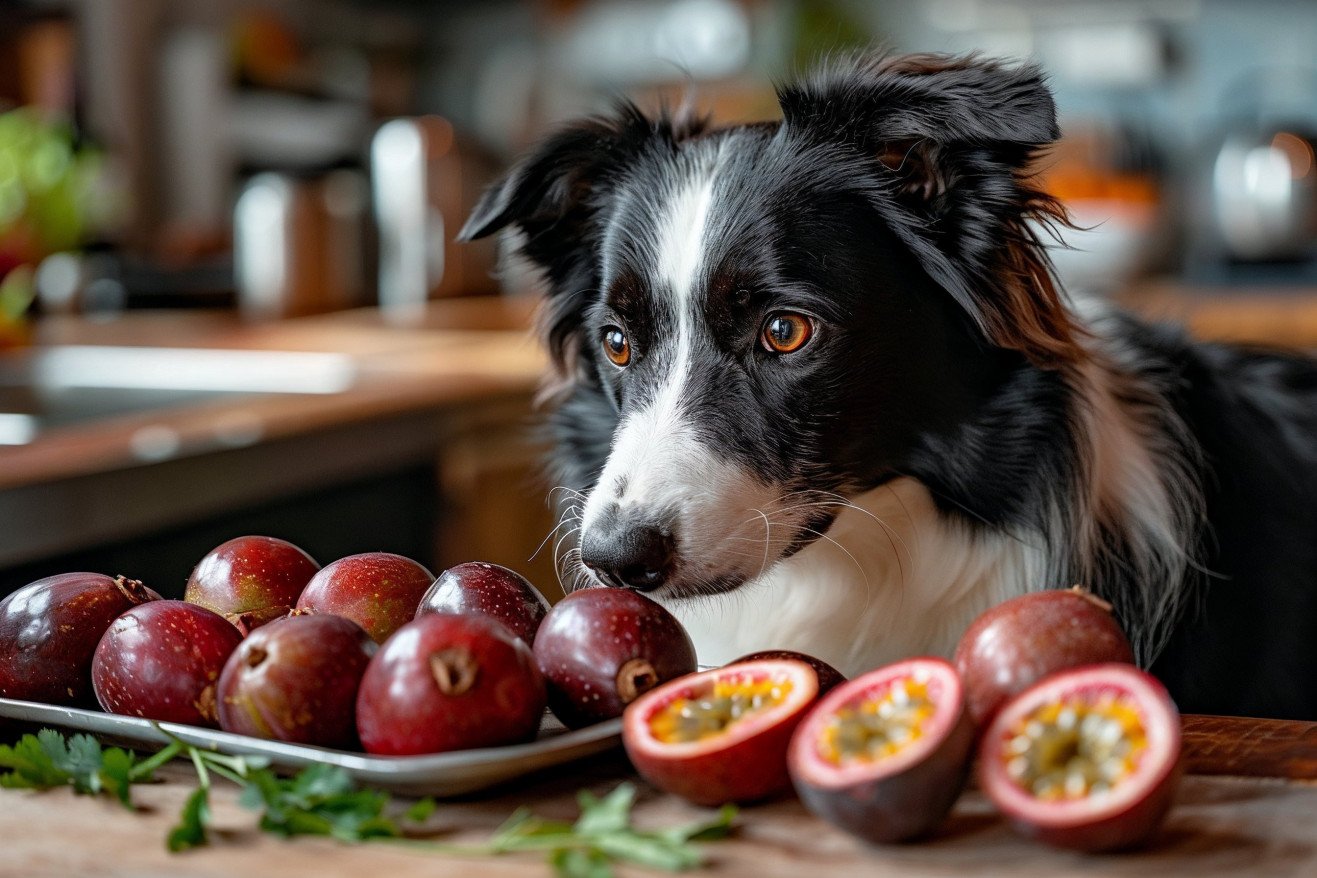Can Dogs Eat Passion Fruit? Benefits and Precautions
4 April 2024 • Updated 3 April 2024

If you've ever tasted passion fruit, you know how delicious and refreshing it is. But can you share this tropical fruit with your dog? The answer is yes, but there are some important caveats. Dogs can eat passion fruit, but it should be fed to them in moderation and with the seeds and rind removed to avoid gastrointestinal issues. Also, because passion fruit is high in fiber and sugar, it can cause an upset stomach if fed in large amounts.
While passion fruit can provide some health benefits for dogs, including antioxidants and fiber, it should be fed to them as an occasional treat and in small amounts. To help you decide if passion fruit is a healthy snack for your dog, we'll look at research on the health benefits and potential risks of dogs eating passion fruit. This includes studies by veterinary nutritionists, information on different dog breeds, and an analysis of the nutritional content of passion fruit to help you understand how passion fruit can fit into your dog's diet.
Can dogs eat passion fruit?
The Risks of Passion Fruit for Dogs: Cyanide Poisoning
The seeds and rind of passion fruit contain cyanogenic glycosides, which can release cyanide when ingested, per Dogster. Cyanide poisoning in dogs from eating passion fruit seeds or rind can result in serious and potentially life-threatening side effects such as vomiting, diarrhea, muscle tremors, hyperventilation, and death if not treated, according to this veterinary reference.
The cyanide content in passion fruit can be unpredictable due to the fruit's ripeness and the conditions in which it was grown, and this makes it hard to determine a safe dose for dogs, per Passiflora Online. If a dog ingests any part of the passion fruit plant that includes the seeds or rind, it should be taken to the vet immediately. The dog may be treated by having its stomach pumped, being given activated charcoal to absorb the poison, and being given supportive care like IV fluids and monitoring the heart, according to veterinary professionals.
Even though the flesh of the fruit is likely to be less toxic, the risk of the dog eating the seeds or rind by accident means it's best to avoid giving passion fruit to dogs. There are many other fruits that are safe and healthy to give to dogs as an occasional treat.
Safe and Healthy Fruits for Dogs
Although passion fruit is toxic to dogs, there are many other fruits that are safe and healthy for dogs to eat in moderation. According to the American Kennel Club, some of the best fruits for dogs are apples, bananas, blueberries, cantaloupe, mangoes, oranges, pears, pineapple, strawberries, and watermelon.
It's important to note that when feeding dogs fruit, you should remove any seeds, pits, rinds, or cores, which can be choking hazards or toxic, according to Purina. Fruits should also be fed in moderation and as an occasional treat, as they are high in natural sugars and can lead to stomach upset if they are fed in large amounts, according to PetMD.
Although the passion fruit plant and its parts are toxic to dogs, there are many fruits that are safe and healthy for dogs to eat and that can provide them with important nutrients without the risk of toxicity. However, it's important to know that the passion fruit plant itself is toxic to dogs and can be dangerous to their health.
Passion Fruit Plant Toxicity: How to Prevent Accidental Ingestion
In addition to the passion fruit itself, the passion fruit plant, including the leaves and vines, is also potentially toxic to dogs. The ASPCA notes that the leaves of the passion fruit plant contain cyanogenic glycosides, which can lead to vomiting, diarrhea, lethargy, and breathing difficulties if ingested in large quantities.
To avoid accidental ingestion, it's important to keep dogs away from any passion fruit plants or vines that may be growing in your yard or garden, according to BuddyDoc. If you think your dog has eaten any part of the passion fruit plant, it's important to get them to the vet right away, as early intervention is key to preventing more serious health issues.
Given the potential risks of the seeds, rind, leaves, and vines, it's best to avoid giving passion fruit to dogs altogether, even if the flesh of the fruit itself may not be as dangerous. The good news is that there are many other fruits that are safe and healthy for dogs and can be given to them as an occasional treat.
Exotic Fruits and Dogs: Are There Any Safe Exotic Fruits?
In addition to the fruits listed above, many pet owners may wonder if there are any tropical or exotic fruits that are safe for dogs. According to Dogster, fruits like dragon fruit, guava, kiwi, and pineapple are generally safe to feed to dogs as long as they are given in moderation and the skin or rind is removed. However, exotic fruits like acai berries, figs, persimmons, and pomegranates are either unsafe or should be given in limited quantities due to potential digestive upset or toxicity. The ASPCA explains that acai berries contain theobromine, which is the main cause of chocolate poisoning in dogs.
As with any new fruit, it’s important to introduce it to a dog’s diet slowly and in small amounts to ensure that they don’t have an adverse reaction or an allergy to it, as pointed out by Healthy Happy Paws. While the flesh of some exotic fruits may be safe, pet owners should still be careful and talk to their vet before giving them to their dog. It’s important to be mindful of portion sizes and how the fruit is prepared when considering exotic fruits for dogs.
Conclusion: How to Keep Your Dog Safe When Feeding Them Fruit
Although passion fruit may seem like an appealing option for dogs, the potential danger of cyanide poisoning and other health risks mean it's not a safe choice. There are plenty of other fruits that are safe and healthy for dogs to enjoy as an occasional treat, including apples, bananas, and berries.
However, pet parents should always make sure to remove any seeds, pits, rinds, or cores that could be toxic or pose a choking hazard before giving fruit to their dogs. They should also be aware that even safe fruits can cause digestive problems if they're given to dogs in excessive amounts due to their natural sugar and fiber content.


